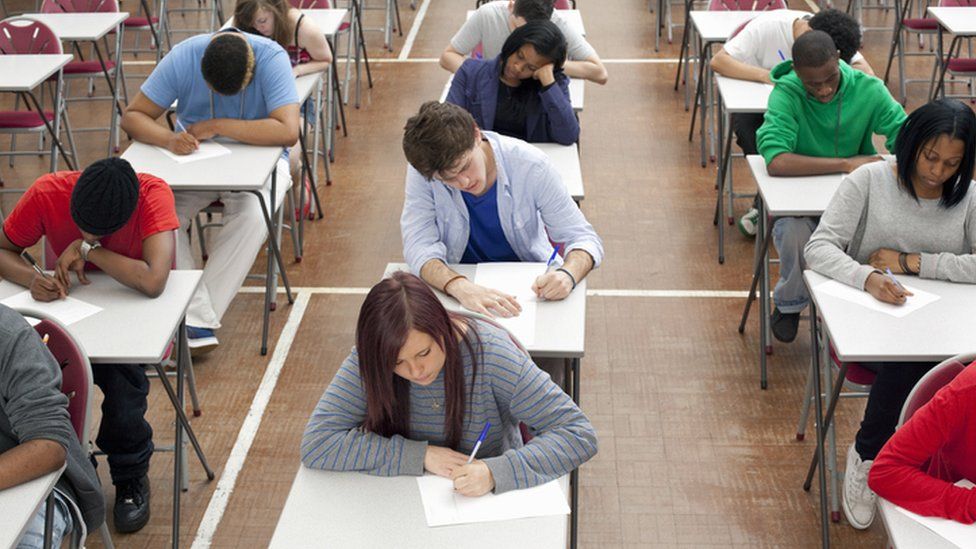The Education Policy Institute says they take fewer qualifications at a lower level than more affluent peers.

image copyrightGetty Images
Poorer students in England are up to three A-level grades behind more affluent students, research suggests.
The Education Policy Institute (EPI) said lower GCSE grades, then fewer and lower level qualifications aged 16-19, causes a “disadvantage gap”.
It found in some areas, poorer students were up to five grades behind.
The Department for Education says it provided over £530m in 2020-21 to support college students.
Students from poorer families begin their A-level or vocational courses already behind more affluent students, and continue to fall further behind, according to analysis by the EPI.
In the first ever study to measure the education “disadvantage gap” among students aged 16-19, provisional findings show that across all qualifications, poorer students are the equivalent of three A-level grades behind similar students from richer families.
But there were variations across England, with poorer students the equivalent of around five A-level grades behind in areas including Knowsley on Merseyside, North Somerset and Stockton-on-Tees.
In sharp contrast in many London areas, poorer students are level with or even slightly ahead of their more affluent peers.
The EPI looked at students’ free school meal status during their last six years of school and their attainment, based on qualifications and grades between the end of secondary school and by the age of 19.
It finds the gap is bigger in A-levels than vocational qualifications.
The researchers say there was no progress in closing the gap between 2017 to 2019, and suggest it is likely to get worse due the impact of the pandemic which has effected poorer communities more severely.
Sam Tuckett, senior researcher at the EPI, said: “For the very first time, this exploratory research gives us a clear understanding of how disadvantaged sixth form and college students are progressing with their learning compared to their peers.
“Our findings demonstrate very plainly that deep-seated inequalities follow poorer teenagers from school through to sixth form and college, and continue to widen further compared to otherwise similar students, as they work towards their qualifications.”
The big gaps in grades is largely explained by poorer students already having lower grades at the end of their GCSEs, the researchers say.
Disadvantaged students are also more likely to take fewer and lower-level qualifications which adds to the gap in results.
There is a “strong case” for extra funding for 16-19 education to stop poor pupils falling further behind, the report suggests.
And targeted support is urgently needed to address learning losses caused by the pandemic, which is likely to impact the poorest students the most.
David Hughes, chief executive of the Association of Colleges, called for the pupil premium which gives extra money to schools to help poorer pupils, to be extended beyond the age of 16.
“Young people in England’s school sixth forms and colleges have lower hours of teaching, less support and less enrichment than their peers in other countries, and less than those in private schools. That needs to change.
Bill Watkin, chief executive of the Sixth Form Colleges Association, said the report provides a welcome perspective on the “chronic underfunding” of sixth form education.
“There is now a broad consensus that young people need additional support to recover from the disruption to their education caused by Covid, but as this report illustrates, sixth forms and colleges have been helping students to recover from a range of disadvantages for many years.”
A Department for Education spokesperson said: “We are determined to ensure disadvantaged students are properly supported while studying at college or sixth form so they can gain the skills they need to progress.
“This includes providing extra funding for disadvantaged 16 to 19-year-old students, specifically those with low prior attainment or who live in the most disadvantaged areas.”